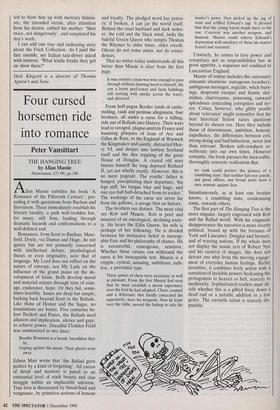Four cursed horsemen ride into romance
Peter Vansittart
THE HANGING TREE by Allan Massie Heinemann, 113.99, pp.346 Allan Massie subtitles his book 'A Romance of the Fifteenth Century', pre- ceding it with quotations from Buchan and Stevenson. These immediately establish his literary locality, a path well-trodden but, for many, still firm, leading through dramatic hazards and confrontations to a well-defined end.
Romances, from Scott to Buchan, Mase- field, Doyle, via Dumas and Hugo, do not ignore but are not primarily concerned with intellectual debate, psychological theses or even originality, save that of language. My Lord does not reflect on the nature of entropy, nor My Lady on the influence of the grand piano on the de- velopment of Islam. Both develop moral and material stature through tests of cour- age, endurance, hope. Or they fail, some- times horribly. Issues are deep but simple, harking back beyond Scott to the Ballads. Like those of Homer and the Sagas, no foundations are better. Five centuries be- fore Beckett and Pinter, the Ballads used allusion and implication, silence and gaps, to achieve power. Dreadful Flodden Field was summarised in two lines:
Besides Branxton is a brook: breathless they lie, Gaping against the moon. Their ghosts went away.
Edwin Muir wrote that 'the Ballad grew perfect by a kind of forgetting'. All excess of detail and memory is pared to an existential level of stark beauty and clan struggle within an implacable universe. True love is threatened by blood-feud and vengeance, by primitive notions of honour and loyalty. The pledged word has poten- cy: if broken, it can jar the world itself. Behind the cruel husband and dark seduc- er, the cold and the black wind, lurks the baleful Green Queen who tempts Thomas the Rhymer to older times, older creeds. Ghosts do not come amiss, nor do coinci- dences.
That no writer today understands all this better than Massie is clear from the first page.
It was country a man was wise enough to pass through without drawing heed to himself. He saw a burnt peel-tower and farm buildings still reeking with smoke across the water, and shivered.
From half-pagan Border lands of cattle- rustling, raids and perilous allegiances, four brothers, all under a curse for a killing, ride out of Ballads into History. Their ways lead to ravaged, plague-smitten France and haunting glimpses of Joan of Arc and Gilles de Raix, to the England of Warwick the Kingmaker and saintly, distracted Hen- ry VI, and deeper into lawless Scotland itself and the dire toppling of the great House of Douglas. A crazed old man fancies himself the long deposed Richard II, yet not wholly crazily. However, this is no mere pageant. The youths' father is hanged, precipitating their departure, 'his legs stiff, his tongue blue and huge, and one eye-ball half-detached from its socket.' The workings of the curse are never far from the gallows, a savage blot on history.
The brothers are distinct. The most vital are Rob and Maurie. Rob is poet and minstrel of an astrological, declining socie- ty. He hears the Elfin Queen, his wife is perhaps of her following. He is divided between his instinctive belief in inescap- able Fate and his philosophy of chance. He is resourceful, courageous, sensitive. Whether these virtues can withstand the curse is his inescapable test. Maurie is a cripple, cynical, amusing, ambitious, ruth- less, a perennial type.
These games of chess were necessary as well as pleasant. From the first Maurie had seen that he must establish a moral supremacy over the lord he had adopted. Chess, counsel and a deference that hardly concealed his superiority, were his weapons. Now he leant over the table, moved the bishop to take his master's pawn, then picked up the jug of wine and refilled Edward's cup. It pleased him that the young baron drank three to his one. Courtesy was another weapon, and humour. Maurie could relieve Edward's depression with mockery of those his master feared and resented.
Unwisely, he comes to love power and conspiracy not as responsibilities but as gross appetite, a sequence not confined to Lancastrian England.
Massie of course includes the customary romantic situations: outrageous treachery, ambiguous messages, regicide, witch burn- ings, desperate escapes and frantic skir- mishes, clairvoyance, poisoning, outward splendours concealing corruption and ter- ror. Critics, however, who glibly prattle about 'relevance' might remember that the best historical fiction raises questions beyond its chosen era. Here they include those of determinism, ambition, honour, expediency, the differences between evil, wrong-doing and bad behaviour, never less than relevant. Broken safe-conducts re- verberate into our own times. However romantic, the book pursues the inexorable, thoroughly concrete realisation that
no rank could protect the princes of a crumbling state; that neither furs nor jewels. nor great offices, nor broad acres were a sure armour against fear.
Simultaneously, as at least one brother knows, a crumbling state, condemning some, rewards others.
The first part of The Hanging Tree is the more singular, largely engrossed with Rob and the Ballad world. With his enigmatic disappearance the narrative is more overtly political, bound up with the fortunes of York and Lancaster, Douglas and Stewart, and of warring nations. If the whole does not display the manic zest of Robert Nye and his carnival of images, this does not detract one whit from the moving engage- ment of everyday human feelings. Richly inventive, it combines lively action with a sensation of invisible powers beckoning the protagonists to heaven or hell, scarcely to mediocrity. Sophisticated readers must de- cide whether this is a gifted foray down a dead end or a notable addition to a live genre. The enviable talent is scarcely dis- putable.










































































 Previous page
Previous page